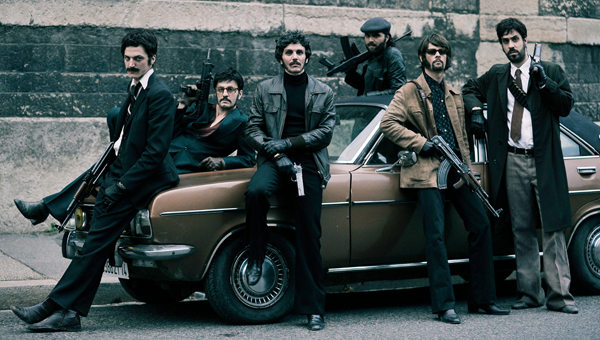A Gang Story Review

A Gang Story isn’t director Olivier Marchal’s first foray into the crime genre, though it does mark his departure from the police procedural story at the heart of his 2004 hit film 36, and French television crime series Braquo. In Marchal’s new film he chooses to focus on the criminal protagonists instead of the detectives who usually intrigue the former police officer turned director.
Gérard Lanvin plays the elderly Edmond Vidal, also known as Momon and real life founder of the Gang des Lyonnais; a gang of thieves who rose to prominence and notoriety during the seventies following a series of audacious armed robberies.
The film is constructed around a dual narrative; a past timeline offering us the roots of the Gang des Lyonnais and “holy friendship” between Momon and co-founder Serge Suttel, and a present day narrative arc which sees Vidal forced out of retirement and back to his criminal ways for a friend in need.
Though subtle for a time, it becomes glaringly obvious that A Gang Story’s narrative pitches the needs of the individual against those of the group; with special attention paid to loyalty and its true cost.
With his life beset by a spiral of consequences derived from poor choices made at a young age, Momon remains oblivious to the significance of his own actions. Naively believing individuals are prisoners to fate, he also falls prey to his impulsive ideals years later.
Marchal manipulates the contradictory image of the family man and criminal to great effect, seducing the viewer into following his protagonist’s story with intrigue to learn whether the melancholy wishes from his opening monologue are realised.
Lanvin delivers a performance of subtle nuance as Momon; balanced between flashes of his own personal jesus and devil, we see him as the loving grandfather as well as the thug who lies dormant within. It’s an alluring combination and displays all the charisma of a typically flawed Marchal protagonist.
A Gang Story’s weakness, however, lies in Marchal’s handling of the dual narrative and most notably its depiction of events from the seventies. There are two key revelations designed to shock the viewer here, yet these are both undermined by Marchal’s stylish yet substance free portrayal of the past which are in stark contrast to the fully conceived scenes of the present day.
The reason why the gang choose to become criminals in the first place seems to be based on little more than a passing whim, as is the development of the characters deep emotional connections to each other from which their intense loyalty stems.
By the end, despite being entertained by an engaging crime story, I couldn’t help but feel that the inclusion of important scenes from the past would have transformed A Gang Story into a more memorable film to stand alongside Marchal’s previous works.
Paul Risker